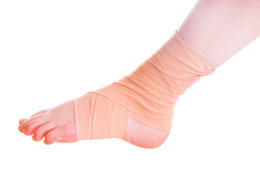Excessive fluid retention in the hands, ankles and feet leads to swollen extremities. If you too are suffering from swelling in your extremities, then you will find the following article very informative.

Peripheral edema is a medical condition that is known as swollen extremities in common terms. One may suffer from swelling of the extremities without knowing the exact cause for this unusual fluid retention. There are many factors that lead to swollen hands and feet. We shall have a look at the causes of edema and even understand the systemic symptoms of this sometimes very painful condition.
Causes of Swelling in the Extremities
Excessive fluid build up in the body is called edema. It is usually seen affecting the feet, ankles, lower legs as well as other parts of the body. Most of the time, it is the ankles and feet that swell due to the action of gravity. There are a number of causes that lead to swelling of extremities. Swollen hands and fingers are common signs of premenstrual syndrome in women. Also, many pregnant women often complain of swollen hands and feet. The pressure on the pelvic veins due to the bulging uterus causes the blood to pool. This pressure causes the blood to push water into the tissues and retain excess water. Thus, the extremities of pregnant women tend to swell. Gym goers, walkers as well as joggers often complain of swelling in their hands and fingers when they begin with a regimen. Carpal tunnel syndrome that affects the upper limb function, also leads to swelling of the upper extremities.
People who tend to stand for long hours like hair stylists, teachers, ticket collectors, etc. suffer from puffy ankles and swollen feet. Also, sitting for long hours or traveling and walking all day will also lead to swollen feet. This is because of poor or reduced blood circulation, obesity, hormonal imbalance, high blood pressure, hot and humid climate, etc. Edema with joint pain may be a sign of an underlying condition like chronic venous insufficiency. When one of the valves in the veins gets damaged, it causes the blood to flow backwards. This causes it to get accumulated in the leg tissues, leading to swelling. Other conditions like congestive heart failure leads to this condition as well. Lymphedema is a condition that occurs due to damaged or blocked lymphatic system; this causes swelling in the arms and legs.
There are many heart, liver and kidney diseases that lead to this condition. These diseases cause fluid to build up and a person to gain weight. Arthritis is a condition that causes swelling in extremities and joint pain. When there are excessive red blood cells, white blood cells and platelet production in the body, it leads to polycythemia. This causes increase in blood thickening and clotting of blood in tiny veins. When this blockage occurs, it may lead to edema of the extremities. Abnormality of pituitary gland causes excessive hormonal secretion leading to edema with pain. People who are allergic to insect bites and stings may also suffer from swollen hands and feet. Frost bite may also lead to swelling in the extremities.
Symptoms
- Swelling in the hands and legs
- Swelling of the ankles
- Increase in size of the feet
- Stiffness of the feet
- Pain and discomfort
- Problems while walking or holding things
Treatment for Swelling in the Extremities
When one suffers from edema, they need to give their feet some rest. They should carry out repetitive clenching of the fists to help blood circulation in the hands. One should sleep with their feet and hands at an elevated position. The position of the feet and hands should be over heart level as it will take off the load on the extremities. This will help reduce the swelling. Reduce the intake of salt in the diet. Sodium can lead to increase in swelling, so watch what you eat. Many people believe that drinking less of water and fluids will help reduce the swelling. On the contrary, one should drink more water every day. This will help reduce the swelling by flushing out the toxins that lead to edema. You can speak to a doctor who may prescribe you with medications like ibuprofen, naproxen, furosemide, etc.
Swelling on any part of the body indicates some health problem that needs medical attention. Avoid standing and sitting for long and eat a low-salt diet. This will help you avoid edema. If you have any more questions, speak to your healthcare provider for more details.


 Peripheral edema is a medical condition that is known as swollen extremities in common terms. One may suffer from swelling of the extremities without knowing the exact cause for this unusual fluid retention. There are many factors that lead to swollen hands and feet. We shall have a look at the causes of edema and even understand the systemic symptoms of this sometimes very painful condition.
Peripheral edema is a medical condition that is known as swollen extremities in common terms. One may suffer from swelling of the extremities without knowing the exact cause for this unusual fluid retention. There are many factors that lead to swollen hands and feet. We shall have a look at the causes of edema and even understand the systemic symptoms of this sometimes very painful condition.